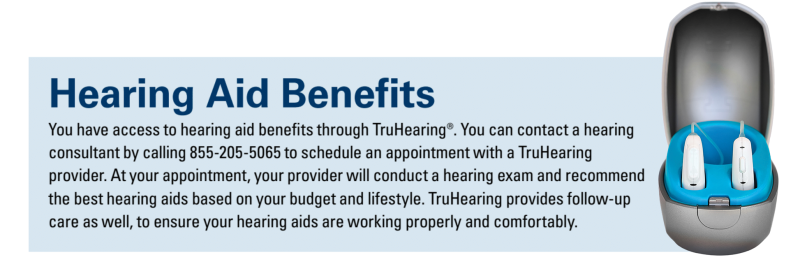Healthy hearing is an important part of your overall wellbeing, and it is normal for your hearing to change as you get older.
Whether you are noticing a ringing in your ears or an increased difficulty understanding others, hearing loss naturally occurs with age. In fact, age-related hearing loss is the third- most common medical condition in the U.S. for adults over 65, according to the World Health Organization (WHO).
While you may not be able to completely prevent hearing loss, it is important to stay proactive in protecting your hearing, managing hearing loss, and seeking treatment.
Protecting your ears
Hearing loss prevention should be a lifelong efort, though according to the Centers for Disease Control and Prevention (CDC), there is no proven way to prevent hearing loss naturally brought on by aging.
However there are steps you can take to prevent further hearing loss caused by noise. Those include:
• Wearing ear plugs or other ear protection to loud public events, like concerts and sporting events.
• Keeping the volume low while listening to the radio, your TV or other electronics.
• Knowing if you are at a higher risk for hearing loss. Groups at greater risk include veterans and those who have a family history of hearing loss.
• Talking to your health care provider about hearing testing and hearing aids.
Did you know?

Hearing loss is the third most common medical condition in the U.S. for adults over 65. SOURCE: CENTERS FOR DISEASE CONTROL AND PREVENTION
Dr. Ian Malm, an ear, nose and throat specialist at Allina Health, says that studies have shown hearing loss can increase the risk for older adults to develop other medical conditions.
“There’s a lot of research with dementia and hearing loss,” Dr. Malm says. “Researchers have noticed that if you have hearing loss, you’re more likely to develop dementia. They think it’s because people with hearing loss tend to self-isolate so there’s not as much stimulation to the brain.”
The Mayo Clinic also notes that hearing loss can lead to increased levels of depression, cognitive decline and create an increased risk for falls.
When to see a doctor
When it comes to gradual hearing decline, Dr. Malm says it is important to talk to your doctor if you notice one ear declining faster than the other, or if your hearing loss is interfering with your daily life. Hearing tests are easy, non- invasive, and will identify if you need treatment.
“You can always get a hearing test without getting hearing aids, it’s always good to just know where you’re at,” Dr. Malm says. “A lot of people are very hesitant to get hearing aids because of the stigma associated with it.”
If you are diagnosed with hearing loss, hearing aids are often the best way to manage it. They are fitted to your outer ear and work to amplify sound within your ear. Dr. Malm says hearing aids can make a big difference not only within patient’s ears, but also in their lives.
“They’ll be able to hear their grandkids or talk at the dinner table with their family or go to a restaurant and be able to communicate with people,” Dr. Malm says. “That’s really important for the quality of a patient’s life.”



